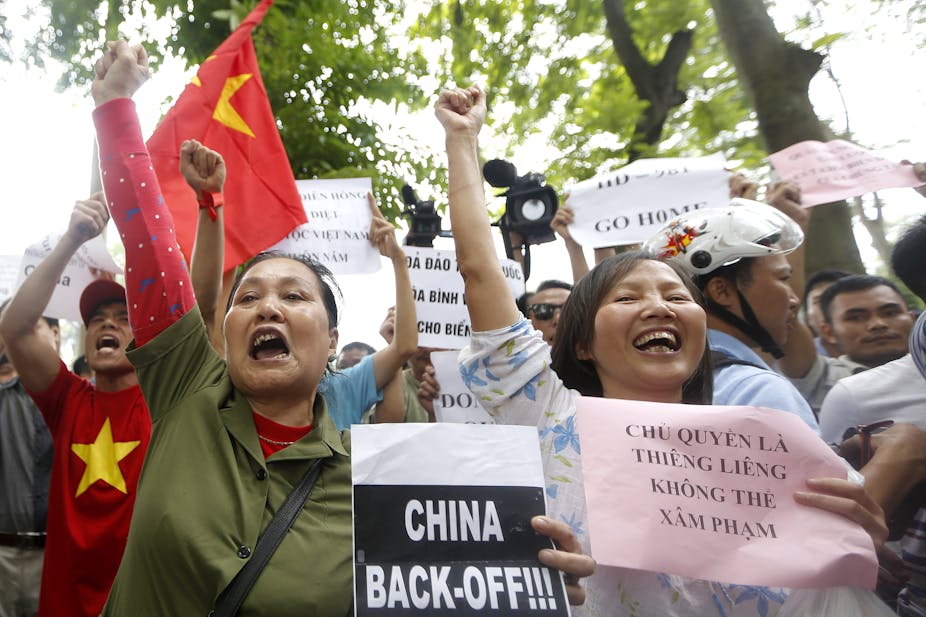Anti-China protests in Vietnam have attracted world-wide attention over the past few days, as hundreds have been injured and at least 21 killed. The riots were sparked by China drilling for oil in a disputed area of the South China Sea. But, while some anger might be understandable, the Vietnamese people risk harming their own economy far more than their powerful neighbour’s.
Tension between the two countries is nothing new, largely down to a long-running feud over islands in the South China Sea. But previous protests in Vietnam were directed primarily at China’s embassy in Hanoi and its consulate in Ho Chi Minh City. The novelty this time round is that the intended targets are Chinese factories in two industrial parks in southern Vietnam – or at least, factories the protesters thought were Chinese-owned.
Businesses linked to Taiwan and Singapore have also been affected – a Taiwanese steel mill was attacked by a “1,000 strong mob”, for instance. It turns out the industrial parks are joint ventures between Singapore and Vietnam.
These protests could have big negative repercussions for Vietnam. “Chinese” investors – a category that also includes those from Taiwan, Singapore and Malaysia – are important contributors to Vietnam’s economy, and the risk is that not only will Chinese investors opt to stay away, but that many others might do the same. There is heavy competition to attract foreign capital, and which factory owner wants to see his or her investment burnt to the ground? Thus, the potential damage to Vietnam’s economy far outweighs the negligible impact that the protests could have on China and its economy.
The peculiarity with the attacks against factories is that it wasn’t only factories linked to China that were attacked. This raises a few questions. Did the rioters not know how to identify the China-linked factories? Did they not find enough such factories? Or are the attacks an indication of broader anti-Chinese sentiments?
If the latter is the case, the question is whether such sentiments might extend to the ethnic Chinese minority that largely resides in the major cities of southern Vietnam. This could affect social cohesion and it could also have economic consequences given the important role played by the ethnic Chinese in Vietnam’s economy.
Not enemies
Despite these protests, it would be wrong to assume that Vietnam and China don’t generally get along. In fact, they have strong co-operative ties and economic relations are also expanding. The two countries have enhanced efforts aimed at managing their differences over the South China Sea, such as the “Agreement on basic principles guiding the settlement of sea-related issues” signed in 2011. This is often overlooked when incidents occur and tension rises between the two countries.
But it is safe to assume that sooner or later something will happen. The two parties still haven’t addressed their overlapping claims to the Paracel Archipelago – known as Xisha Islands in Chinese and as Hoàng Sa in Vietnamese – or to areas China claims within the so-called “nine-dashed lines”, which partly overlap with Vietnam’s claims to maritime zones to the east of its coast.

The fact that the two countries have developed various dispute management mechanisms and established lines of communication at different administrative levels augurs well for a proper management of the current incident and related tension. This would be in line with how previous incidents between the two countries have been managed. The longer term challenge will continue to be how they can avoid actions in the South China Sea that causes periodic incidents and tension.
In the current situation, the Vietnamese people would be best off displaying united support for their country’s China policy. Such a stance would strengthen Vietnam’s defence of its sovereignty and territorial integrity, and its position towards China. It would also help economic relations – certainly more than the current factory protests, anyway.
If protests against China are carried out they ought to be peaceful and directed at diplomatic locations. Steer clear of those Taiwanese mills. Attacking factories that might be linked to China or owned by Chinese citizens only hurts individuals and not China itself. In fact, such actions will only hurt Vietnam and its economy, and not China.

